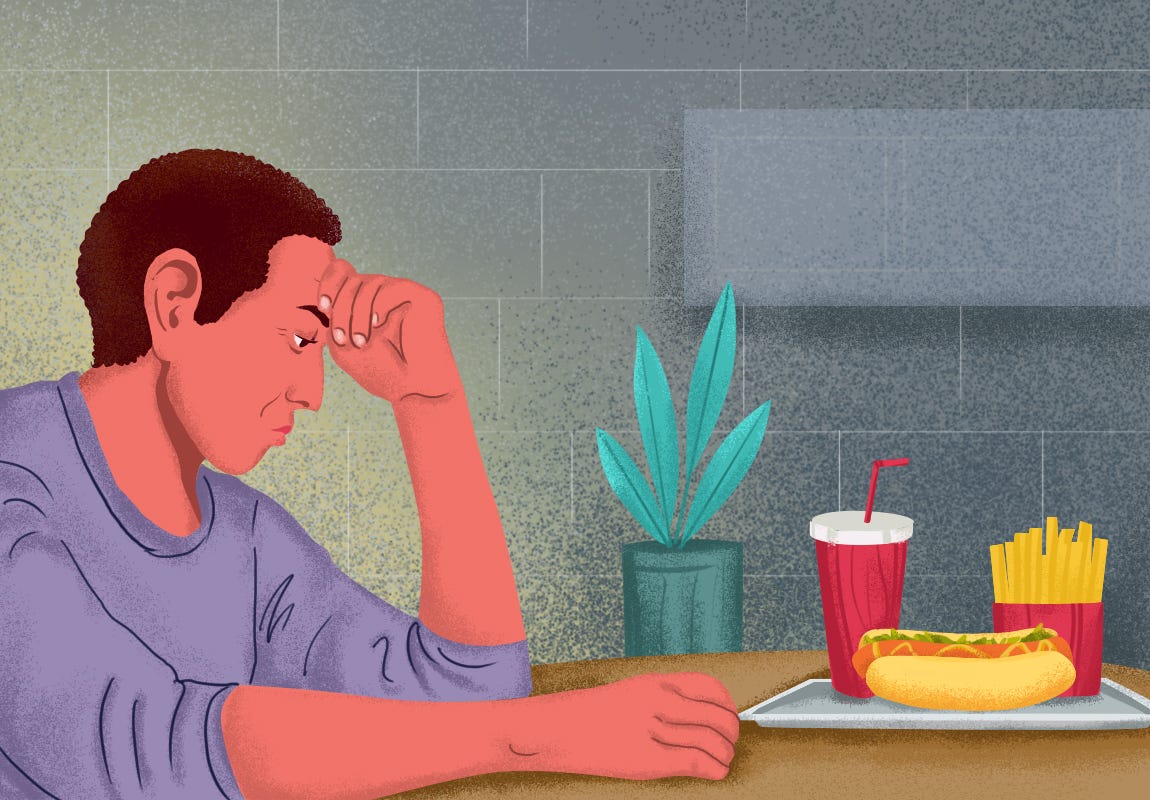Eating disorders are a group of psychological conditions that lead to the development of unhealthy eating habits. They may begin with a fixation on food, body weight, or body shape. If left untreated, eating disorders can have serious health consequences and even result in death in severe cases. In fact, eating disorders are among the most lethal mental illnesses, coming in second only to opioid overdose.
People suffering from eating disorders may exhibit a variety of symptoms. Common symptoms include severe food restriction, food binges, and purging behaviours such as vomiting or excessive exercise.
What are the signs of an eating disorder?
Eating disorders have different symptoms, but each condition involves an extreme focus on food and eating issues, and some involve an extreme focus on weight. This obsession with food and weight may make it difficult to focus on other aspects of life.
Mental and behavioural signs may include:
➔ dramatic weight loss
➔ concern about eating in public
➔ preoccupation with weight, food, or dieting
➔ constipation, cold intolerance, and lethargy
➔ intense fear of weight gain
➔ severely limiting and restricting the amount and types of food consumed
➔ refusing to eat certain foods
➔ denying feeling hungry
➔ expressing a need to “burn off” calories
➔ repeatedly weighing oneself
➔ patterns of binge eating and purging
➔ developing rituals around food
➔ excessively exercising
➔ cooking meals for others without eating
Physical signs may include:
➔ stomach cramps and other gastrointestinal symptoms
➔ difficulty concentrating
➔ atypical lab test results (anaemia, low thyroid levels, low hormone levels, low potassium, low blood cell counts, slow heart rate)
➔ dizziness
➔ fainting
➔ feeling cold all the time
➔ sleep irregularities
➔ menstrual irregularities
➔ dry skin
➔ dry, thin nails
➔ thinning hair
➔ muscle weakness
➔ poor wound healing
➔ poor immune system function
Types of eating disorders
1. Anorexia nervosa
Anorexia nervosa (an-o-REK-see-uh) is a potentially fatal eating disorder characterised by abnormally low body weight, intense fear of gaining weight, and a distorted perception of weight or shape. Anorexics exert extreme effort to control their weight and shape, which frequently interferes with their health and daily activities.
Anorexia is characterised by excessive calorie restriction or the use of other methods to lose weight, such as excessive exercise, the use of laxatives or diet aids, or vomiting after eating. Even if you are underweight, attempting to lose weight can cause serious health problems, sometimes leading to fatal self-starvation.
2. Bulimia nervosa
Bulimia (boo-LEE-me-uh) Nervosa, also known as bulimia, is a serious, potentially fatal eating disorder. Bulimia is characterised by episodes of bingeing and purging that involve a sense of loss of control over your eating. Many bulimics also restrict their eating during the day, which leads to more binge eating and purging.
During these episodes, you typically consume a large amount of food in a short period of time before attempting to burn off the excess calories in an unhealthy manner. Because of guilt, shame, and an intense fear of gaining weight from overeating, you may force vomiting, exercise excessively, or use other methods, such as laxatives, to eliminate the calories.
If you have bulimia, you are probably obsessed with your weight and body shape, and you may judge yourself harshly for your perceived flaws. You could be of normal weight or even slightly overweight.
3. Binge-eating disorder
When you have a binge-eating disorder, you regularly overeat (binge) and feel out of control of your eating. Even if you're not hungry, you may eat quickly or consume more food than you intended, and you may continue eating even after you're uncomfortably full.
You may feel guilty, disgusted, or ashamed of your behaviour and the amount of food consumed after a binge. However, you do not attempt to compensate for this behaviour through excessive exercise or purging, as someone suffering from bulimia or anorexia might. Due to embarrassment, you may choose to eat alone.
At least once a week, a new round of bingeing begins. You could be of average weight, overweight, or obese.
When should you see a doctor?
Eating disorders have the potential to completely take over your life. Seek medical attention if you are experiencing any of these issues or believe you may have an eating disorder.
Now put on your thinking hats and think about the following questions for a couple of minutes.
How would you explain the term “eating disorders” to your students?
Can you think of some factors that may contribute to eating disorders?
Write down your thoughts and discuss them with your students, children, and your colleagues. Listen to their views and compare them with your own. As you listen to others, note how similar or different your views are to others’.
Thank you for listening. Subscribe to The Scando Review on thescandoreview.com.
Happy Teaching!














Eating Disorders